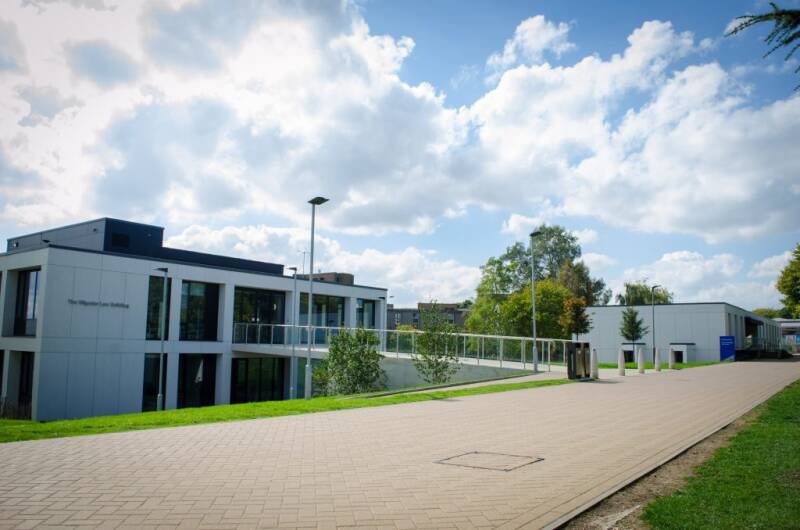The University Law Clinic provides free access to vital legal services for members of our community. Find out more here.
The Clinic specialises in social welfare law, which means it focuses on areas of law that affect fundamental aspects of people’s lives: family, employment, housing, immigration and asylum, and welfare benefits.
We are proud of the fact that Kent Law Clinic was the first of its kind in the UK, opening its doors in 1973. Although the Clinic has evolved over the years, our approach has always been to work with students on real life cases. This enables us to help members of our community who are in need of legal help and at the same time to enrich our students’ education.
Where is the Kent Law Clinic located?
The Clinic is based in the Wigoder Law Building on the Canterbury campus.
Who is involved with the Clinic? How many staff and students do you have that are working for the Clinic?
The Clinic is part of Kent Law School. The Clinic supervisor team are all members of the academic staff in the Law School. We were appointed specifically to work in the Clinic because of our expertise as lawyers in practice.
Our students are the heart of the Clinic. We have students that work in the Clinic as part of an assessed module, and others who volunteer on a co-curricular basis. Students are invited to be part of the Clinic throughout their time at Kent, either as an undergraduate or post-graduate studying Law.
In addition, the Clinic is supported by local solicitors and barristers who volunteer their time for free to offer legal advice to members of the public at evening advice sessions.
Tell us a bit more about how students are involved. What skills/experiences do students build from their involvement?
Students are involved in every aspect of the Clinic from taking details about a new enquiry from a member of the public through to attending court with one of the supervisors. Students learn to experience the law differently and to think about how the law operates in practice in contrast to how it appears in a textbook. They learn a lot about the reality of working on live cases, which among other things involves communicating with people. The students are strongly motivated to help. They develop problem solving skills, as well as other valuable skills such as drafting legal documents and how to carry out careful legal research.
What is the key ethos behind the Kent Law Clinic?
The ethos of the Clinic is to help members of the public with legal problems when they cannot afford legal advice, and at the same time to provide our students with a rich educational experience that enhances their understanding of the law.
In the context of the Kent Law Clinic, what do public and civic engagement mean? Why is it important to you?
As mentioned above, the Clinic focuses on social welfare law. There have been huge funding cuts to legal services which would historically assist members of the public in these areas of law. Whilst the Clinic cannot fill the gap created by these cuts, it has always recognised how much these issues affect peoples’ lives and seeks to do what it can to offer legal advice and representation to those who cannot find help elsewhere.
How do you engage with the community and different organisations? What kind of organisations do you engage with?
We engage with many members of the public who contact us for advice. We also work with local solicitors and barristers, many of whom volunteer their time to support the Clinic. We have links with Citizen’s Advice Bureaus (CAB) and charities across Kent, who refer cases to us. Sometimes social workers or those in similar roles will refer people to us.
What kind of cases are you supporting?
The Clinic specialises in social welfare law, focussing on family, employment, housing, immigration and asylum, and welfare benefits. We also provide some advice in civil litigation, and wills and probate.
How do you work and what kind of support do you offer?
An example of one of our services is the Evening Advice Sessions. In these meetings, members of the public are offered an individual free appointment with a volunteer legal advisor to discuss their legal problem. These sessions cover a variety of areas of specialism including housing, employment, family, civil litigation, and wills & probate. Law students sit in on these appointments and learn from their involvement.
The Clinic may also offer a written advice to individuals who have been referred to us by charities or the CAB.
The Clinic takes on cases each term and may conduct advocacy in Court on behalf of clients. The student-focused nature of the Clinic means that we are only in a position to take a small number of cases at a time to ensure the students can play a significant role in the conduct of the case.
What do you consider to be the biggest success of the law Clinic to date?
It is really hard to single out any one success. Every client, student or member of staff who has contributed to the Clinic’s story would probably answer this question differently!
There have been some beautiful moments over the years which are memorable to each of us. Not all of these are ‘big’ successes, but very many cases have had a significant impact on people’s lives, for example by:
- Assisting clients in family disputes involving contact with their children following relationship breakdown
- Helping tenants faced with possession proceedings to keep their homes
- Helping people appeal decisions of the DWP denying entitlement to disability benefits
- Claiming support through the Inheritance Act for young people left penniless after their carer’s death
- Establishing or preserving public access to land (open spaces) or public rights of way
- Obtaining compensation or reinstatement for clients unfairly dismissed from their employment
- Helping clients in immigration appeals, including young vulnerable clients seeking leave to remain in the UK or in family reunion cases
The list goes on…!
How can I get in touch if I would like to seek legal advice from the Clinic?
If you have a legal issue and are unable to afford to pay for legal representation, you are welcome to get in touch with the Clinic. Please fill in our New Enquiry Form and we will contact you.
Please note that the Kent Law Clinic’s services operate in line with the University’s academic term dates between October and March, with a reduced service provided between March and September.

